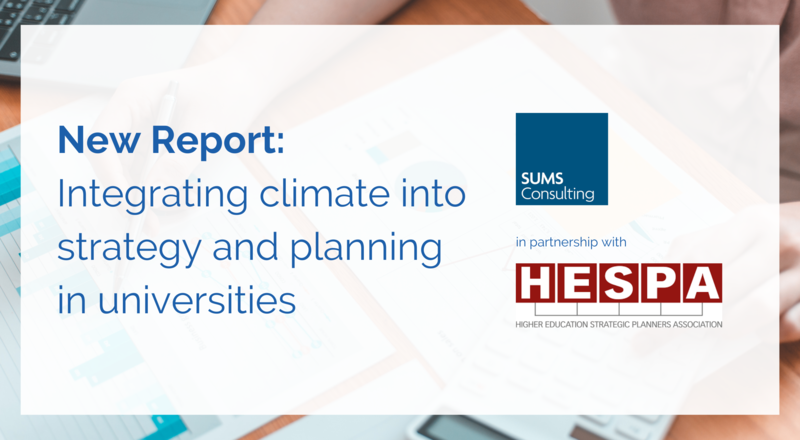the need to have the specialist expertise of sustainability professionals at the table
Where are we? Where are we going?
Climate change is amongst the most important strategic drivers for universities and all organisations. But it is difficult to integrate into strategy and planning because of its scale and complexity, and the fact that it touches every part of an institution’s work.
A new report released today by SUMS Consulting and the Higher Education Strategic Planners Association (HESPA) looks at the current state of sector practice for integrating climate as a strategic driver and makes recommendations to support universities’ journey towards being net zero, climate resilient institutions.
A separate Executive Summary is also available.
The report emphasises the need to have the specialist expertise of sustainability professionals at the table to develop the strategic position of climate at universities, and looks at how strategic planners, sustainability teams and other professional groups can work together towards this end.
Key findings include:
Climate change is amongst the most important strategic drivers for universities and all organisations. But it is difficult to integrate into strategy and planning because of its scale and complexity, and the fact that it touches every part of an institution’s work.
A new report released today by SUMS Consulting and the Higher Education Strategic Planners Association (HESPA) looks at the current state of sector practice for integrating climate as a strategic driver and makes recommendations to support universities’ journey towards being net zero, climate resilient institutions.
A separate Executive Summary is also available.
The report emphasises the need to have the specialist expertise of sustainability professionals at the table to develop the strategic position of climate at universities, and looks at how strategic planners, sustainability teams and other professional groups can work together towards this end.
Key findings include:
- Measures for integrating climate into institution strategy and planning are at variable stages of adoption across the sector. While some are now widely adopted and can be considered standard practice, others are diffusing or emergent, used at only a small number of institutions at present.
- In institutions’ self-assessment of the effectiveness of their practice around integrating climate as a strategic driver, around half (47.9%) agree or strongly agree their practice is effective, around one third (32.9%) disagree or strongly disagree, with the rest (19.2%) expressing no strong view.
- A wide range of models, roles and responsibilities for leadership around climate is evident across the sector. This is due to the agenda’s relative novelty and the diversity of institutions’ size, overall structures and models for the sustainability and strategic planning functions in particular.
- No specific model has a definitive relationship with higher integration and self-efficacy scores, in terms of which role or function leads the strategic agenda. The variable which does appear linked to higher scores is collaboration between the planning and sustainability teams, which is a stronger factor for progress than leadership by any specific function.
SUMS Consulting are a Strategic Partner of EAUC. We are proud to provide sustainability consulting services to the further and higher education sector, in partnership with them. Get involved here.











